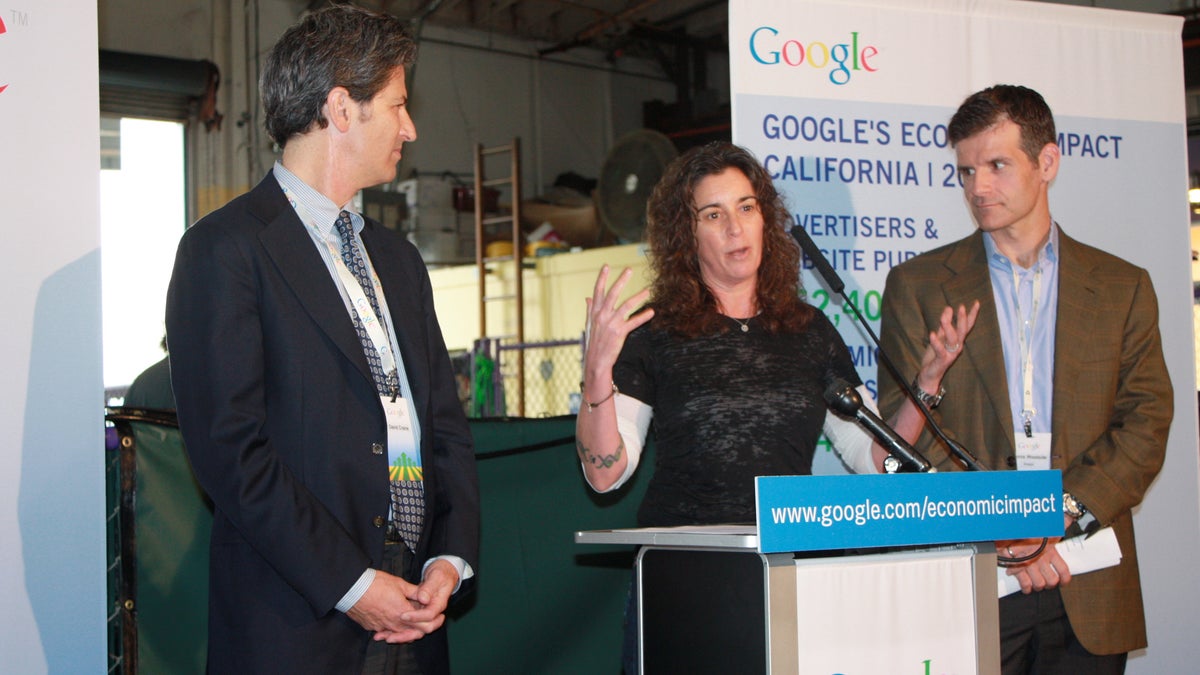Google's primer on how it helps the economy
The Web titan claims a $54 billion impact in the U.S. through its ad programs as it tries to show the world how it's helping small businesses.

OAKLAND, Calif.--Everyone knows that Google is the richest Internet company of our time. But Google doesn't think people know enough about the impact its services have on the broader economy.
In an effort to shine a brighter light on its economic contributions, Google held a series of press conferences around the country Tuesday highlighting the impact that AdWords, AdSense, and Google nonprofit grants have on the small business community. The events accompanied the release of a report claiming that Google advertisers generated $54 billion in U.S. economic activity during 2009, and that doesn't even count the taxes that co-founders Sergey Brin and Larry Page will inject into state and federal coffers over the next five years as they sell off stock.
A public relations stunt? Of course: Google's California event was held against the loud backdrop of the Happy Hound dog day care center in West Oakland, in what had to be the worst-smelling press conference venue this side of the press room at the Consumer Electronics Show. But the impact that AdWords and AdSense have had on small businesses is clear, even if the $54 billion number itself is designed to shock and awe.
Suzanne Golter, founder and manager of Happy Hound, has been an evangelist for Google's AdWords program for years. When she first started advertising with AdWords she was spending thousands of dollars a month to place ads alongside search results for "doggie day care Oakland." It took a while for the ads to have an effect, but they always paid for themselves in terms of leads generated by the ads, and eventually started to produce a much bigger return to the point where she had to advertise less because she was having to turn away business, she said.
Google calculated its $54 billion impact by taking the total number of AdWords customers and AdSense publishers and calculating how much profit they received for each dollar they spend with Google. This required a couple of assumptions: one, that AdWords advertisers generate $1 in profit for $1 spent with the program (based on cost-per-click data and the assumption that advertisers aren't willing to lose money bidding on ads), and two, that searchers click on organic search results five times for every click on an ad.
However, searchers who click on search results aren't necessarily as interested in buying something from that company as those who click on ads, so Google estimated the profit generated by each search click as 70 percent of the profit generated by ad clicks. According to the report, that means that for every $1 spent with AdWords, companies generate $8 of profit through clicks from both search results and ads combined.
Google used a simpler number to calculate the effect of AdSense on publishers, taking the total amount of money it paid to those publishers in 2009. AdSense publishers get 68 percent of the revenue generate by those ads, and AdSense search customers get 51 percent of revenue from search ads placed on their site, Google disclosed for the first time this week.
And Google also took the amount of contributions it has made through the Google Grants program, which donates free advertising to nonprofits. The result for the U.S. was $54 billion in economic impact, which doesn't take into account employees or the advertising effects generated by other products like Google Maps or YouTube.
Google isn't sure if it's going to update that number as time goes on, according to a representative, and didn't have historical data to show how that number has changed over Google's history.
Few would argue against the notion that AdWords is a simple way for small businesses to reach potential customers with far more control over their target audience than traditional small business advertising vehicles, like the Yellow Pages.
"Before the Internet, it was very difficult for a small business to attract an audience and get customers from scratch," said Dennis Woodside, vice president for Google's Americas sales and operations. "People think of Google as a search engine and they don't understand how it participates in the economy."
But the report is just the latest attempt from Google to regain control of its image among the public and government regulators, which went off the rails a bit for a few years as Google grew beyond anyone's wildest expectations (except for Brin and Page, perhaps).
Ask average people what they think of Google these days and you'll get a wide range of responses, from people who think of the company as an innovation engine that provides an extremely valuable free service, to people who love to compare Google to Skynet, a joke that grew old a long time ago but reveals a real sense of distrust as to Google's motives.
In many ways, Google has truly created a marketing-industry ecosystem around its search engine. Its report didn't even attempt to assess the economic impact of search-engine optimization firms and advertising agencies that have created jobs for an awful lot of people to help small businesses understand how to best profit from Google, a few charlatans aside.
For example, Happy Hound's Golter said she was recently forced to hire an advertising agency to handle her AdWords account as she worked on expanding her business, and she's still generating healthy profits even with that added expense.
However, the release of the report shows that Google also has a keen eye on the way it is perceived by the general public. After all, this is a company that famously pledged "you can make money without doing evil." That means you have to bend over backwards to prove you're doing good.
Correction: This story incorrectly stated the name of Google vice president Dennis Woodside in an earlier version.